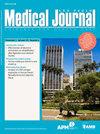动手:外科模拟训练。
IF 1.3
4区 医学
Q2 MEDICINE, GENERAL & INTERNAL
引用次数: 1
摘要
本文章由计算机程序翻译,如有差异,请以英文原文为准。
HANDS-ON: Training Simulation in Surgery.
Methods of the teaching-learning binomial in surgery has undergone major transformations in the last decade, moving from purely informational content models of environments that stimulate theoretical “know-how” by incorporating skills and competencies. There has been a paradigm shift in the training of surgical residents from the traditional ‘‘apprenticeship’’ model to a hybrid one, involving simulation training. This shift has been in response to several current challenges in residency training, including time constraints, patient safety concerns, financial costs, and decreasing durations of training programs. 1 During the past several years, major shifts in surgical education have brought into question whether surgical residency programs could truly ensure competency and technical proficiency in these surgeons. 2 Simulation is an increasingly vital component of graduate medical education and becoming the standard of practice in many residency programs, particularly in surgical specialties, owing to the need for moving basic skill acquisition out of operating rooms into surgical skill laboratories. Deliberate practice is an educational technique that aims to improve performance through intense training and preparation. These steps include repetition, assessment, and feedback, which lead to performance improvement. 3
求助全文
通过发布文献求助,成功后即可免费获取论文全文。
去求助
来源期刊

Sao Paulo Medical Journal
医学-医学:内科
CiteScore
2.20
自引率
7.10%
发文量
210
审稿时长
6-12 weeks
期刊介绍:
Published bimonthly by the Associação Paulista de Medicina, the journal accepts articles in the fields of clinical health science (internal medicine, gynecology and obstetrics, mental health, surgery, pediatrics and public health). Articles will be accepted in the form of original articles (clinical trials, cohort, case-control, prevalence, incidence, accuracy and cost-effectiveness studies and systematic reviews with or without meta-analysis), narrative reviews of the literature, case reports, short communications and letters to the editor. Papers with a commercial objective will not be accepted.
 求助内容:
求助内容: 应助结果提醒方式:
应助结果提醒方式:


